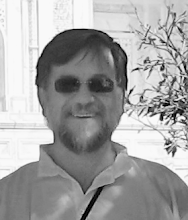He is, without a doubt, a prodigiously intelligent and, I truly believe, deeply spiritual man. Rowan Williams, the Archbishop of Canterbury, is for all the distinctive flyaway hair, bushy beard and large eyeglasses, a man of lyrical proportions. Slight of build, although of average height, Archbishop Rowan chose to sit for his presentation last night, rather than stand, as Presiding Bishop Katharine did for hers. This meant that I found myself watching the Archbishop’s hands as he spoke. They curved through the air in such a way as to shape the very words he was saying. Like brush strokes from a painter’s brush, his hands gave his words color and meaning. Yet I felt no invitation in them-- erudition and deep thought, certainly, being privy to an elegant endeavor-- but no invitation to join in.
Archbishop Williams' acceptance to attend and speak to this General Convention was a very big deal, although played down in its significance across the Anglican Communion. He had refused, after all, to attend the Convention three years ago in Columbus. Would some who are outside the American Church see this as an acquiescent gesture on his part? By his presence, is he condoning the actions of the Episcopal Church, seen so unfavorably by others, notably some Anglicans in Africa and the Southern Hemisphere?
If Rowan Williams was willing, as is evidently the case, to accept this criticism, he and the shapers of the evening’s event were not going to engage directly in any Church controversy. Bishop Katharine, Archbishop Rowan and three young Episcopalians working in the fields of environment, justice and global health all spoke eloquently about the effects of the current global crises. It was a rich and meaningful conversation. However, I had the feeling that the Archbishop was like the visitor who studiously avoids the puddle the puppy left on the living room floor. I do not suggest that the issues causing such consternation are distasteful or inconvenient, but rather say there are those, including those on whom we rely for leadership, who act as if they are.
There was much anticipation Thursday morning as the time approached for the daily Eucharist; the Archbishop was scheduled to preach. Would there be any new word about how he felt and what he thought, personally, about the Episcopal Church and the actions we have taken in past Conventions? He was much more personal, expressing gratitude for the role the American Church has taken, even apologizing for actions taken by Churches outside the United States. His sentiments were heartfelt and, at least by me, welcome. Then, as has happened so often in the past, the Archbishop said, “I hope you take no actions that will push us further apart.”
Push us further apart? It is not universally accepted that anything the Episcopal Church did is what broke us apart. Some of us chose to move away from the rest of us. This is a very old and tired argument. It’s time for us, while we have the opportunity at this Convention, to move forward, beyond the arguments and justifications. It is the time for bold and powerful leadership; may God send it now.
